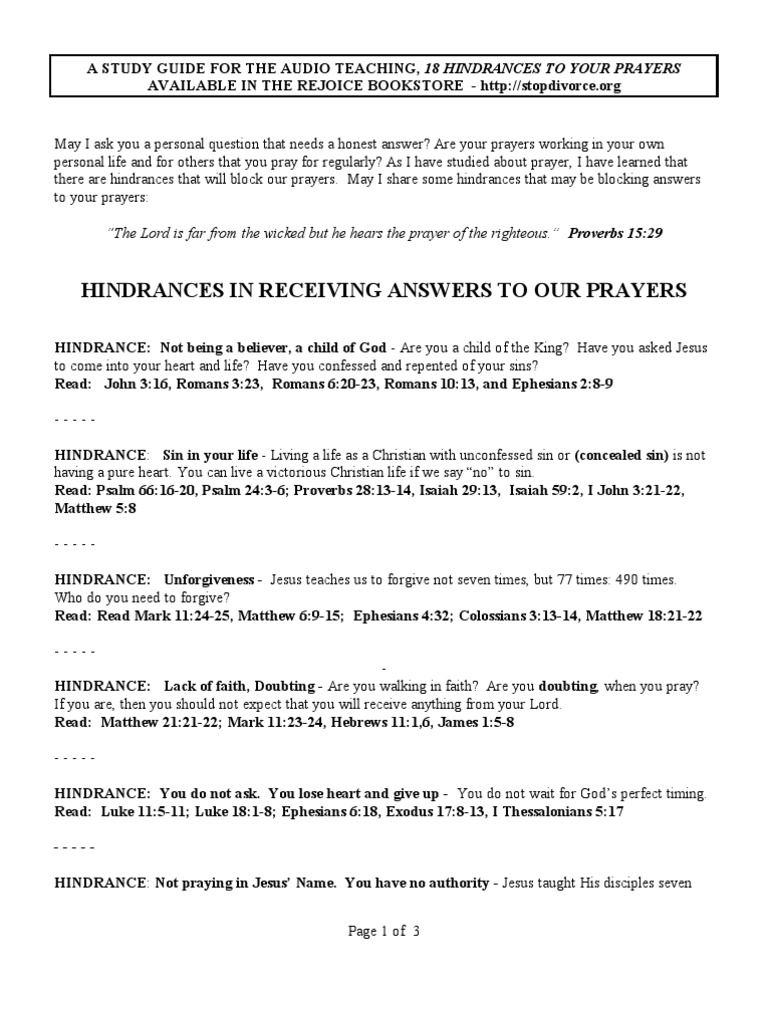The act of prayer holds a profound significance in the Bahá’í Faith, serving as a vital conduit for spiritual growth and communion with the Divine. Nevertheless, various hindrances can obstruct individuals from fully availing themselves of the transformative power of prayer. To surmount these obstacles, it is imperative to delve into the Bahá’í teachings, which elucidate the principles of effective prayer and encourage a shift in perspective that can enrich one’s spiritual journey.
First and foremost, it is essential to understand the intrinsic nature of prayer. In Bahá’í belief, prayer is not merely a ritualistic expression; it is regarded as a dynamic dialogue with God, encompassing both supplication and thanksgiving. By reframing prayer as a profound exchange, individuals can foster a deeper connection and approach it with sincerity, thus minimizing distractions that otherwise impede meaningful engagement. Acknowledging the divine presence during prayers serves to elevate the experience beyond a mere duty into an opportunity for genuine communion.
One significant hindrance to effective prayer is the presence of distractions. In an era dominated by incessant notifications and the relentless pace of life, individuals often find their thoughts straying during moments of contemplation. To navigate this challenge, one might cultivate a designated prayer space, free from external stimuli. This sacred environment enables the individual to foster a mindset conducive to attentive communication with the Divine. Furthermore, establishing a consistent routine—whether at dawn, dusk, or any time that resonates—can help anchor the practice of prayer, reducing the allure of distractions.
In conjunction with external distractions, internal conflicts can undermine the efficacy of prayer. Doubts and apprehensions may arise, leading individuals to question the very nature of their supplications. Bahá’í teachings emphasize the importance of cultivating faith as a bulwark against such uncertainties. Engaging with the sacred texts and reflecting on the countless instances where prayers were answered can fortify one’s belief in the power of divine response. Additionally, the act of gratitude serves an essential role—it not only aligns the heart with positivity but also reframes the perception of prayer as an invitation rather than a request, thereby inviting the Divine to respond more readily.
Another significant hindrance manifests as a sense of isolation and disconnection. The Bahá’í principle of community emphasizes that collective prayer can potentiate individual supplications. Sharing the experience with fellow believers fosters a comforting environment where one can collectively seek divine guidance. Rituals such as the Nineteen-Day Feast exemplify this communal spirit, blending prayer, reflection, and fellowship. The presence of community can yield profound insights that might remain hidden in solitude, reinforcing the belief that one is never alone in their spiritual journey.
Moreover, the inclination to view prayer merely as a transactional endeavor can serve as a barrier. When individuals approach prayer solely with an expectation of receiving something in return, this mindset can lead to disappointment and frustration. Bahá’í teachings encourage practitioners to embrace an attitude of surrender instead—seeking alignment with divine will rather than personal desires. This shift in perception allows individuals to find solace in the act of prayer itself, regardless of the immediate outcomes. Embracing uncertainty can pave the way for profound spiritual growth, as individuals learn to trust in the wisdom of the divine plan.
Equally crucial is the awareness of emotional readiness. Anguish, grief, or overwhelming joy can all influence one’s capacity for prayer. It is detrimental to suppress emotions while praying; such repression creates a barrier between the soul and the Divine. Instead, the Bahá’í teachings advocate for the integration of emotions into the prayer process. Pouring out one’s heart honestly and vulnerably can transform prayer into a cathartic experience. This emotional honesty not only opens up the heart to receive divine blessings but also deepens the transformative potential of the prayer experience itself.
In addition to addressing internal and external barriers, it is vital to acknowledge the significance of intention in prayer. The clarity of purpose can amplify the potency of one’s supplication. Bahá’í teachings assert that intentions should align with universal principles, transcending the self to the collective good. By infusing prayers with intentions that encompass broader humanitarian concerns, individuals can cultivate an awareness that enriches their own spiritual journey. As a result, the prayer transcends personal desires, becoming a vehicle for collective well-being and attracting divine provisioning for all.
Finally, the culmination of the journey towards overcoming hindrances in prayer lies in recognizing the intrinsic interconnectedness of all creation. The Bahá’í faith posits that humanity constitutes a single family, and thus prayers can extend beyond personal reflection. Engaging in prayers for others, for peace, or for the advancement of civilization aligns with the core Bahá’í principle of unity. This broader perspective fosters a sense of compassion and responsibility, encouraging individuals to actively contribute to the spiritual elevation of both themselves and the world.
In essence, overcoming the hindrances to prayer necessitates a comprehensive understanding of Bahá’í teachings. By cultivating a sincere approach, establishing a conducive environment, fostering community, embracing vulnerability, and cultivating intentionality, individuals can transcend barriers that may obstruct their spiritual growth. Ultimately, the practice of prayer, when approached with an open heart and mind, becomes a transformative experience, inviting profound divine communion and establishing a pathway to personal and collective enlightenment.
